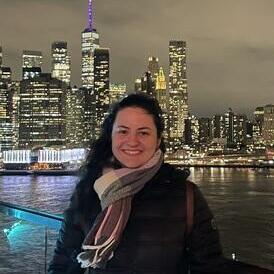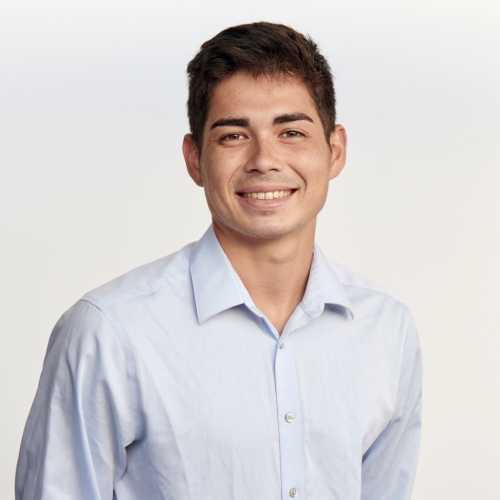National Science Foundation’s Graduate Research Fellowship Program
We are so lucky to have such talented students, and this year, two of them have obtained National Science Foundation's Graduate Research Fellowship (NSF-GRFP) which is a highly competitive application and provides fellowship support for graduate students in science, technology, engineering, and mathematics to receive an advanced degree. Recipients are given a three-year award consisting of a fellowship stipend and an education allowance, in addition to the powerful networking opportunities and resources afforded by being selected as a fellow.
The Department of Psychology is fortunate to have several NSF fellows in our graduate program. Our two most recent recipients of this prestigious fellowship are Alice Smaniotto Aizza, a first-year student in the Developmental Area with Dr. Ariel Starr, and Zac Trevorrow, a second-year student in the Adult Clinical Area with Dr. Jennifer Forsyth.

Alice Smaniotto Aizza
Let's start with the basics, where are you from and where did you complete undergrad/masters? I am originally from São Paulo, Brazil and I went to undergrad at the University of Texas at Austin. Before coming to UW, I worked as a research coordinator at Columbia University-New York State Psychiatric Institute (NYSPI).
How did you wind up at UW/why did you apply here? What do you think about living in Seattle? I decided to apply to UW because I was excited about the Department of Psychology’s research labs and I enjoyed the Psychology PhD program’s structure and opportunities. I am happy to be here at UW/Seattle!
What is your research interest and how did you get into it (what inspires/motivates you)? I am interested in exploring the cognitive development of young children, particularly focusing on the interplay between executive function and language development. I find it fascinating to explore how these processes come to be and how children interact with the environment around them to develop and grow.
How did you learn about your funding opportunity and tell us about the application/waiting process? I learned about this funding opportunity through Dr. Claudia Lugo-Candelas, my post-bacc PI. She allowed me to “tag along” in her grant writing process and strongly incentivized me to apply for graduate school funding as well as providing guidance about the application timeline and requirements. The writing process itself was very enjoyable, I used it as an opportunity to reflect on my trajectory and brainstorm about my research interests. Both Dr. Lugo-Candelas and Dr. Jessica Church-Lang (my former undergraduate honors thesis mentor) provided extremely valuable feedback on my application materials.
Do you have any advice/tips/suggestions for others who may apply to this opportunity? About graduate study in general? I recommend starting early to allow enough time to brainstorm your research ideas, ask for feedback from any mentors/peers (I always think my ideas improve when talking about them!), and revise your drafts a few times. As you are planning your proposal, I would also recommend spending some time reviewing the award criteria and previous successful proposals to get a good sense of how to express your ideas as clearly and effectively as possible.
What do you like doing in your spare time? I love to read, spend time with my friends and family, and watch various shows/series.

Zac Trevorrow
Let's start with the basics, where are you from and where did you complete undergrad/masters?
I grew up in Honolulu, a few blocks away from the University of Hawaiʻi. I completed a bachelor’s in psychology and a minor in food systems and nutrition at Tufts University in Boston, MA.
How did you wind up at UW/why did you apply here? What do you think about living in Seattle?
UW was by far my top choice when applying to clinical PhD programs, particularly because I felt so strongly about joining Jen Forsyth’s lab. I knew I wanted to continue researching copy-number-deletions, schizophrenia, and the brain, and after meeting Jen, I knew that she was the best possible mentor for me.
Living in Seattle comes with great perks at high prices. As a grad student, it’s been important to take advantage of all the free things here– the city parks, the great hiking, and my favorite, the UPASS. One of my favorite things about Seattle is how sporty the city is. Storming the field after Washington Football beat Oregon last year is a cherished memory.
What is your research interest and how did you get into it (what inspires/motivates you)?
I’m broadly interested in schizophrenia risk and how specific risk factors are expressed in neurological and cognitive development. Schizophrenia has always been very personal for me, as I grew up witnessing its impact on individuals and families. One of the strongest motivations for researching schizophrenia is the unknown– there is so much left to understand about schizophrenia risk and the onset of the disorder that we have enormous opportunities to improve the lives of people and further our collective knowledge.
How did you feel when you learned that your application was accepted and that you will receive funding?
I remember texting my parents and Jen immediately and then crying in my room.
What is the name of your project, and general scope for the layperson?
My proposal is a longitudinal study of copy number deletions on cognitive development and neurodevelopmental deviation in the Adolescent Brain Cognitive Development (ABCD) Study. I want to understand the cumulative impact of the deleted stretches of genetic code that we carry on brain tissue growth and cognitive performance in a large and diverse sample of children and adolescents. Results from the proposed research could facilitate the early identification of children at high-risk for clinically relevant levels of cognitive impairment (i.e., before observing behavioral risk factors), facilitating early behavioral and educational interventions.
Do you have any advice/tips/suggestions for others who may apply to this opportunity? About graduate study in general?
This grant wouldn’t have been possible without the help of students in the department who graciously shared their NSF application essays and professors taking the time to provide feedback on my drafts. The new Grant & Fellowship Repository is a wonderful initiative by the psych department and I’d encourage anyone applying to use it.
What do you like doing in your spare time?
I play in two recreational soccer leagues and started to ref UW intramural sports. My true love is cooking, so I love any opportunity to spend a whole day cooking something from one of my cookbooks.
The last book and/or movie you saw and enjoyed?
I read Ficciones by Jorge Luis Borges recently and would recommend it to anyone! Dune 2 was also sooo good.